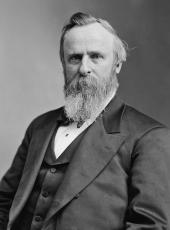To the House of Representatives:
After mature consideration of the bill entitled "An act making appropriations to supply certain deficiencies in the appropriations for the service of the Government for the fiscal year ending June 30, 1880, and for other purposes," I return it to the House of Representatives, in which it originated, with my objections to its passage.
The bill appropriates about $8,000,000, of which over $600,000 is for the payment of the fees of United States marshals and of the general and special deputy marshals earned during the current fiscal year, and their incidental expenses. The appropriations made in the bill are needed to carry on the operations of the Government and to fulfill its obligations for the payment of money long since due to its officers for services and expenses essential to the execution of their duties under the laws of the United States. The necessity for these appropriations is so urgent and they have been already so long delayed that if the bill before me contained no permanent or general legislation unconnected with these appropriations it would receive my prompt approval. It contains, however, provisions which materially change, and by implication repeal, important pans of the laws for the regulation of the United States elections. These laws have for several years past been the subject of vehement political controversy, and have been denounced as unnecessary, oppressive, and unconstitutional. On the other hand, it has been maintained with equal zeal and earnestness that the election laws are indispensable to fair and lawful elections, and are dearly warranted by the Constitution. Under these circumstances, to attempt in an appropriation bill the modification or repeal of these laws is to annex a condition to the passage of needed and proper appropriations, which tends to deprive the Executive of that equal and independent exercise of discretion and judgment which the Constitution contemplates.
The objection to the bill, therefore, to which I respectfully ask your attention is that it gives a marked and deliberate sanction, attended by no circumstances of pressing necessity, to the questionable and, as I am clearly of opinion, the dangerous practice of tacking upon appropriation bills general and permanent legislation. This practice opens a wide door to hasty, inconsiderate, and sinister legislation. It invites attacks upon the independence and constitutional powers of the Executive by providing an easy and effective way of constraining Executive discretion. Although of late this practice has been resorted to by all political parties when clothed with power, it did not prevail until forty years after the adoption of the Constitution, and it is confidently believed that it is condemned by the enlightened judgment of the country. The States which have adopted new constitutions during the last quarter of a century have generally provided remedies for the evil. Many of them have enacted that no law shall contain more than one subject, which shall be plainly expressed in its title. The constitutions of more than half of the States contain substantially this provision, or some other of like intent and meaning. The public welfare will be promoted in many ways by a return to the early practice of the Government and to the true rule of legislation, which is that every measure should stand upon its own merits.
I am firmly convinced that appropriation bills ought not to contain any legislation not relevant to the application or expenditure of the money thereby appropriated, and that by a strict adherence to this principle an important and much needed reform will be accomplished.
Placing my objection to the bill on this feature of its frame, I forbear any comment upon the important general and permanent legislation which it contains, as matter for specific and independent consideration.
RUTHERFORD B. HAYES
Rutherford B. Hayes, Veto Message Online by Gerhard Peters and John T. Woolley, The American Presidency Project https://www.presidency.ucsb.edu/node/204555

